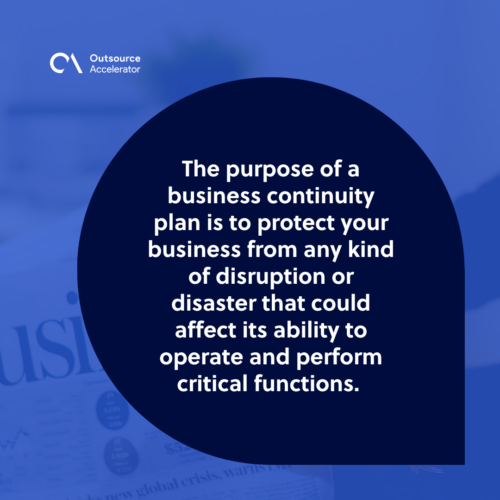Business Continuity Plan (BCP)
Definition
What is a business continuity plan (BCP)?
A business continuity plan (BCP) is part of a risk management strategy to help business operations recover from potential threats, including:
- Cybersecurity attacks
- Weather-related calamities
- Other force majeure events (e.g., pandemics)
Business continuity planning involves listing all the possible risks the business will face, how this will affect its operations and critical business functions, and how they can prevent this from happening.
It also aims to protect the assets and resources of a company in case these threats happen.
Business continuity management refers to the application of the business continuity plan. It encompasses the entire approach an organization takes to prepare for and respond to potential events.

What is a business continuity team?
A business continuity team is a group of people who work together to plan, prepare, and carry out emergency procedures in the event of an emergency at your workplace.
They ensure that business continuity planning occurs so that the team can respond quickly and effectively when an emergency strikes.
The members of your business continuity team should include, among others:
- A lead person (usually someone with experience in operations or logistics)
- A communications person who can update employees on issues as they arise
- An IT person who can help with any data loss issues caused by the disruption
Business continuity plan vs. Disaster recovery plan
While a business continuity plan and a disaster recovery plan are similar in nature, each can work differently in terms of implementation and the measures where it is applied.
A business continuity plan outlines the measures for the continuity of business operations in terms of disruptions of any kind.
A disaster recovery plan may be a part of a company’s BCP. It involves the recovery and prevention process in times of man-made and natural disasters.
Business continuity planning process
A comprehensive business continuity planning suite consists of five stages:
1. Risk and impact analysis. First, teams create a business impact analysis and risk assessment to see how a disaster or threat can affect a business.
2. Strategy design. From the identified risks and impacts, the team will then form strategies to overcome and mitigate them.
3. Implementation. The continuity plan will then be integrated across the organization and applied to most business processes.
4. Validation. Regular testing and evaluation will be done to ensure the effectiveness of the business continuity plan.
5. Maintenance. A successful business continuity plan is constantly modified as needed. In this stage, the BCP is improved as new risks, disasters, and company updates arrive.
What is the purpose of a business continuity plan?
The purpose of a business continuity plan is to protect your business from any kind of disruption or disaster that could affect its ability to operate and perform critical functions.
Disruption could be anything from an unexpected power outage or natural disaster to a more serious event such as fire, theft, or vandalism.
A comprehensive business continuity plan helps your organization remain viable in the event of a disruptive event. Business continuity plans should be designed to help your organization recover quickly after an emergency and resume normal operations.
Good business continuity planning will help you:
- Ensure that business functions can continue operating when unforeseen events occur, such as natural disasters, terrorist attacks, or other emergencies.
- Recover quickly from a disruption
- Help you comply with regulations regarding having a business continuity plan in place
- Minimize the impact on your customers by ensuring that they receive support services during a disruption
- Protect your reputation by ensuring that customers and suppliers are kept informed about any disruption to your business
- Ensure effective communication with employees, customers, and suppliers in the event of a disruption
- Save money by reducing costs associated with the loss of key people or resources

Business continuity plan template
Your business continuity plan template is a living document, meaning it should be updated regularly with new information, like new employees or new processes.
Necessary details of a business continuity plan template should include:
- A process for getting back up and running after any kind of disaster
- A list of resources available to help you during an emergency (addresses, phone numbers, emails)
- A plan for communicating with customers before, during, and after a disaster
- The name of someone who will be responsible for updating the plan as needed
Templates to document business continuity plans are available from resources on the internet.
3 elements of the business continuity plan
Here are the three primary components of a business continuity plan:
Recover personnel
Successful BCPs have to secure the approval of their superiors. Set up a team of people from each of your company’s most important departments to oversee the process and assign a manager to handle it.
Recovery procedure
This section of your BCP details how you intend to keep your firm running in the event of an emergency. This strategy should identify and prioritize essential company assets, including equipment, the IT system, and contact lists.
Preparing a recovery procedure will help you identify potential hazards or threats to these assets and compile an emergency disaster recovery plan.
Data archiving
Your BCP should always include a backup plan. There are two sorts of backups to consider when creating a backup strategy: on-site and off-site.
The on-site backup includes tape drives and external hard drives. As an emergency backup, make a copy of the following records: Financial and legal papers, contracts, and policies.







 Independent
Independent




